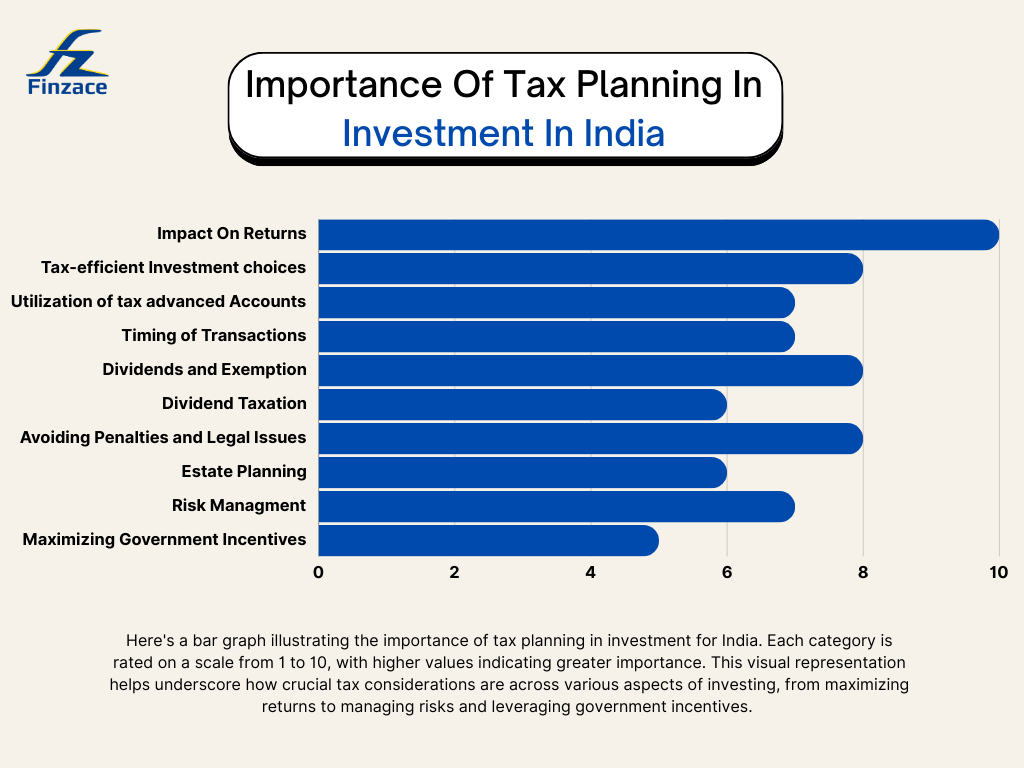What is Tax Planning In India?
- Reducing overall tax burden: Tax planning aims to take advantage of various deductions, exemptions, and tax-saving instruments available under the Income Tax Act to lower the total amount of taxes owed.
- Improving cash flow management: Effective tax planning allows individuals and businesses to anticipate and prepare for tax payments, avoiding disruptions to their cash flow.
- Aligning with life/business changes: Tax planning helps adapt one’s strategy to minimize the tax implications of major life events or business changes.
- Optimizing investment returns: Understanding the tax treatment of different investment options enables making choices that maximize after-tax returns.
- Ensuring tax compliance: Tax planning is done within the legal boundaries set by the tax authorities, avoiding penalties for tax evasion or avoidance.
Understanding and managing taxes is crucial when investing for several reasons:

1. Impact on Returns
Taxes can significantly affect your investment returns. The post-tax return is what ultimately matters, as it is the actual gain you get to keep after paying taxes. Different investments are taxed differently, so understanding the tax implications can help maximize your net returns.
2. Tax-Efficient Investment Choices
Choosing tax-efficient investments can reduce the amount of taxes you owe. For example:
1. Equity Investments: Long-term capital gains from equities held for more than a year are taxed at a lower rate (10% for gains exceeding ₹1 lakh) compared to short-term capital gains (15%).
2. Debt Investments: Interest from fixed deposits is fully taxable at your marginal tax rate, whereas long-term capital gains from debt funds (held for more than 3 years) are taxed at 20% with indexation benefits.
3. Utilization of Tax-Advantaged Accounts
Certain investment accounts offer tax benefits:
1. Public Provident Fund (PPF): Contributions, interest earned, and withdrawals are all tax-free.
2. National Pension System (NPS): Contributions are eligible for tax deductions under Section 80CCD(1) and 80CCD(1B).
4. Timing of Transactions
Timing your transactions can help manage tax liabilities:
1. Harvesting Losses: Selling losing investments to offset gains can reduce your taxable income.
2. Holding Period: Holding investments for the required period can qualify you for long-term capital gains tax rates, which are generally lower than short-term rates.
5. Deductions and Exemptions
Some investments qualify for tax deductions and exemptions:
1. Section 80C: Investments in instruments like ELSS (Equity Linked Savings Scheme), PPF, and National Savings Certificates (NSC) can reduce your taxable income up to ₹1.5 lakh.
2. Section 54: Exemption from capital gains tax on the sale of property if the proceeds are reinvested in another residential property.
6. Dividend Taxation
Understanding how dividends are taxed is important:
1. Dividend Distribution Tax (DDT): Abolished in 2020, dividends are now taxed at the investor’s applicable tax rate, affecting the net returns from dividend-yielding investments.
7. Avoiding Penalties and Legal Issues
Proper tax planning helps ensure compliance with tax laws, avoiding penalties and legal issues:
1. Tax Filing: Accurate and timely tax filing is essential to avoid interest and penalties.
2. Audit Risks: Proper documentation and tax planning can minimize the risk of audits and additional scrutiny by tax authorities.
8. Estate Planning
Effective tax planning can help in estate planning:
1. Gift Tax: Understanding the tax implications of gifting assets can help in planning tax-efficient transfers of wealth.
2. Inheritance Tax: While there is no inheritance tax in India, managing the tax on income generated from inherited assets is important.
9. Risk Management
Tax planning is a part of comprehensive financial planning:
1. Diversification: Choosing tax-efficient investments can diversify your portfolio and manage risk.
2. Liquidity: Understanding the tax implications of selling investments can help in managing liquidity needs without incurring high tax liabilities.
10. Maximizing Government Incentives
Governments often provide tax incentives to promote certain types of investments:
1. Infrastructure Bonds: Investments in certain bonds can provide additional tax benefits.
2. Green Investments: Investments in environmentally friendly projects may offer tax incentives.
In summary, considering taxes when investing helps in maximizing net returns, complying with tax laws, and effectively managing your overall financial strategy.
Tax Planning for Major Life Events: How Life Changes Can Impact Your Taxes
Major life events can significantly impact your taxes, and it is crucial to stay informed about the implications to minimize any potential financial burden. In this blog, we will explore how significant life changes can affect your taxes and provide valuable insights on tax planning strategies to help you navigate these changes.

1. Marriage and Divorce
Marriage and divorce can both have significant tax implications in India. Here are some key considerations:
- Marriage: Married couples in India do not file taxes jointly as in some other countries. Each spouse must file their own individual tax returns. However, gifts between spouses are exempt from tax, which can be beneficial for tax planning.
- Divorce: Alimony received is taxable under the head ‘Income from Other Sources’. However, the lump-sum alimony received at the time of divorce is not taxable. Any maintenance paid monthly is taxable for the recipient and deductible for the payer.
2. Having Children
Having children can bring significant tax benefits in India, including:
- Children’s Education Allowance: A tax exemption of up to ₹100 per month per child (for up to two children) is available for children’s education allowance.
- Children’s Hostel Allowance: An additional exemption of ₹300 per month per child (for up to two children) is available for hostel expenditure allowance.
- Deductions for Tuition Fees: Under Section 80C, taxpayers can claim deductions for tuition fees paid for up to two children, with the overall limit for Section 80C being ₹1.5 lakh.
3. Buying or Selling a Home
Homeownership can have significant tax implications in India, including:
- Mortgage Interest Deduction: Under Section 24(b), homeowners can deduct interest paid on home loans up to ₹2 lakh per annum for self-occupied property.
- Principal Repayment Deduction: Under Section 80C, principal repayment of home loans qualifies for a deduction within the overall limit of ₹1.5 lakh.
- Capital Gains Tax: When selling a property, long-term capital gains (property held for more than 2 years) are taxed at 20% with indexation benefits, while short-term capital gains are added to the taxpayer’s income and taxed as per the applicable slab rate.
4. Retirement and Social Security
Retirement and social security can have significant tax implications in India, including:
- Retirement Accounts: Contributions to the Employees’ Provident Fund (EPF), Public Provident Fund (PPF), and National Pension System (NPS) are eligible for deductions under Section 80C and 80CCD, subject to limits.
- Pension Income: Pension received is taxable as salary. However, a commuted pension (a lump sum payment) is exempt up to certain limits, and a non commuted pension (regular monthly payments) is fully taxable.
- Senior Citizen Benefits: Senior citizens (60 years and above) enjoy higher exemption limits, and very senior citizens (80 years and above) have even higher limits.
5. Inheritance and Estate Planning
Inheritance and estate planning can have significant tax implications in India, including:
- Inheritance Tax: There is no inheritance tax in India. However, any income generated from the inherited assets is taxable.
- Gift Tax: Gifts received from specified relatives are not taxable. Gifts from non-relatives exceeding ₹50,000 in a financial year are taxable as income from other sources.
- These considerations highlight the various ways in which life events can impact tax obligations and benefits in India.
Why Choose Finzace for Your Investment Needs?
Discover the Best Fixed Return Investment in India
Are you searching for the best fixed-return investment in India? Look no further than Finzace! We offer a variety of fixed-income products designed to meet your financial goals. Our options ensure steady and reliable returns, making them ideal for investors seeking both stability and growth.
High Return Fixed Income Investments
Maximize your wealth with Finzace’s high return fixed income investments! Our carefully curated selection outperforms traditional savings options, helping you achieve your financial aspirations with confidence. Invest smartly and watch your returns soar!
Low-Risk Investment Options in India
Security and peace of mind are crucial in investing. Finzace provides low-risk investment options in India that protect your capital while delivering consistent returns. Sleep easy knowing your investments are both safe and profitable.
Best Safe Investments with High Returns
Why settle for less when you can have the best? Finzace brings you the best safe investments with high returns. Our meticulously vetted solutions ensure you enjoy excellent returns without compromising on safety. Experience the best of both worlds with us!
Secured Investment Options
Your investments deserve the utmost protection. Finzace’s secured investment options are backed by tangible assets, reducing risk and enhancing reliability. Secure your financial future with our investment choices.
Best Short-Term Fixed Income Investments
Need quick and reliable returns? Finzace offers the best short-term fixed-income investments. Our short-term products deliver rapid returns without sacrificing safety or yield, making them perfect for your immediate financial needs.
Unlock high-yield opportunities with Finzace’s seamless platform for investment in NCD (Non-Convertible Debentures). NCDs are a lucrative addition to your portfolio, offering attractive returns and stability. Invest in NCDs with ease and efficiency.
Elevate your earnings with Finzace’s high-yield corporate bonds. Our platform connects you with top-rated corporate bonds that provide impressive interest rates, offering a strong and dependable alternative to traditional fixed-income investments.
Join Finzace today and revolutionize your investment strategy. With options that offer high returns, low risk, and unmatched security, your journey towards financial prosperity begins here!
Download our app now!!
Download link (Android): https://play.google.com/store/apps/details?id=icreditspace.com
Download link (Apple): https://apps.apple.com/in/app/finzace-earn-12-returns/id6446245952

